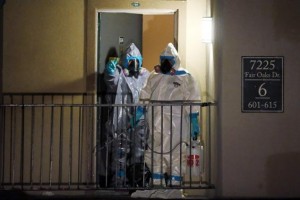
BY LISA MARIA GARZA AND SHARON BEGLEY
(Reuters) – The first person diagnosed with Ebola in the United States was fighting for his life at a Dallas hospital and appeared to be receiving none of the experimental medicines for the virus, a top U.S. health official said.
Thomas Eric Duncan became ill after arriving in Texas from Liberia two weeks ago, heightening concerns that the worst Ebola epidemic on record could spread from West Africa, where it began in March. The hemorrhagic fever has killed at least 3,400 people out of the nearly 7,500 probable, suspected and confirmed cases.
“The man in Dallas, who is fighting for his life, is the only patient to develop Ebola in the United States,” Dr. Thomas Frieden, director of the U.S. Centers for Disease Control and Prevention (CDC), said on CNN’s “State of the Union.”
Frieden, who is slated to brief President Barack Obama on Monday, said doses of the experimental medicine ZMapp were “all gone” and that the drug, produced by San Diego-based Mapp Biopharmaceutical, is “not going to be available anytime soon.”
A second experimental drug, made by Canada’s TekmiraPharmaceuticals Corp, “can be quite difficult for patients to take,” he said, adding that the doctor and the patient’s family would decide whether to use the drug.
“As far as we understand, experimental medicine is not being used,” Frieden said. “It’s really up to his treating physicians, himself, his family what treatment to take.”
Duncan remained in critical condition, said Wendell Watson, spokesman for Texas Health Presbyterian Hospital in Dallas.
Earlier on Sunday health officials said they were seeking a “low-risk” homeless man, one of 38 people who potentially had contact with Duncan. A spokeswoman for Dallas County’s top political official, Judge Clay Jenkins, later said the man had been found and was being monitored.
The CDC has identified another 10 people who had direct contact with Duncan as being at greatest risk. None from either group has shown symptoms, health officials said.
Ebola, which can cause fever, vomiting and diarrhea, spreads through contact with bodily fluids such as blood or saliva.
PATIENT ARRIVING IN NEBRASKA
In Nebraska, another hospital was preparing for the arrival of an Ebola patient who contracted the virus in Liberia.
Nebraska Medical Center spokesman Taylor Wilson would only identify the patient as a male U.S. citizen expected to arrive on Monday. The father of Ashoka Mukpo, a freelance cameraman for NBC News who contracted Ebola in Liberia, told Reuters on Friday that his son was going to Nebraska for treatment.
The Nebraska hospital had treated and released Dr. Rick Sacra, an American missionary who contracted Ebola in Liberia, last month. Sacra was admitted to UMass Memorial Medical Center in Worcester, Massachusetts on Saturday for a likely respiratory infection but tested negative for Ebola, hospital officials said late on Sunday. He was being removed from isolation.
Duncan’s case has highlighted problems that American public health officials are trying frantically to address: The Dallas hospital that admitted him initially did not recognize the deadly disease and sent him home with antibiotics, only to have him return two days later in an ambulance.
“The issue of the missed diagnosis initially is concerning,” Frieden said, adding that public health officials had redoubled their efforts to raise awareness of the disease.
Frieden said he was confident the disease would not spread widely within the United States. U.S. officials are also scaling up their response in West Africa, where Ebola presents an enormous challenge, he added.
Asked if the United States should suspend flights to and from affected countries or impose a visa ban on travelers from those areas, Anthony Fauci, director of the National Institute of Allergy and Infectious Diseases, said “absolutely not.”
“When you start closing off countries like that, there is a real danger of making things worse,” he told “Fox News Sunday.”
(Additional reporting by Doina Chiacu and Aruna Viswanatha in Washington, Jonathan Kaminsky in New Orleans, Lewis Krauskopf in New York; Editing by Chris Michaud andJeremy Laurence)








